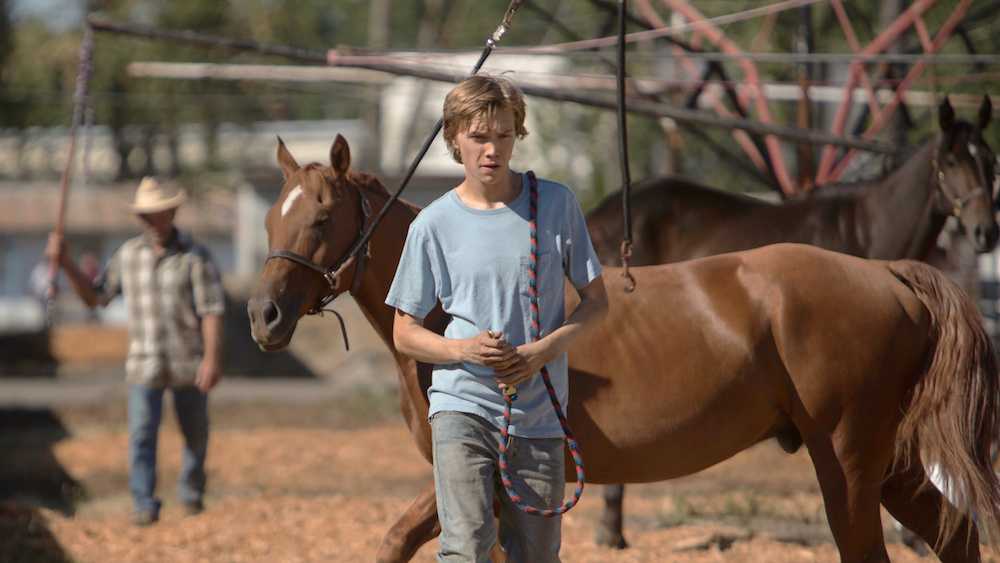File Under 2018 #45: Lean on Pete
/What it's about: Charlie is a teenage boy who has spent much of his life moving from town to town, wherever his father can get work. Now in the area of Portland, Oregon, he stumbles upon a small horse track and gets menial work cleaning stables and helping with the horses owned by Del [Steve Buscemi]. Charlie's favorite is a 5-year-old quarter horse named Lean on Pete. When Del decides to sell Pete after the horse isn't able to perform on the track, Charlie decides to steal the horse and embark on a long journey to find a lost relative. The boy and the horse suffer the elements and loneliness together, with plenty of heartbreak along the way.
Unorganized thoughts:
Lean on Pete is absolutely devastating. You've been warned. If you see Lean on Pete, don't make any plans after. You're going to need some time.
There is never a point in Lean on Pete where the sense is "things are going to turn out OK." Even in the moments of grace or hope, something is askew, usually the remnants of emotional damage that Charlie has been through.
Yes, this is my second "horse film" in a row after previously seeing The Rider. Besides the four-legged companions, there isn't much in common here. Whereas The Rider is understated and with a documentary style, Lean on Pete is unabashed in its drama. Both are very, very good.
I'm not really a horse person [whatever that means]. I've never had any interaction with horses. My only association with them are the smelly ones that carriage tourists up Michigan Avenue in downtown Chicago. Lean on Pete, surprisingly, doesn't over-sentimentalize the horse specifically -- despite being named after Pete, this is Charlie's story through-and-through.
Charlie is a blank slate. When the story begins, not much is really known about him -- he seems like a nice kid who is more responsible than other kids his age because his mother's absence and his father being a bit absentee. When he starts working for Del he didn't have any particular interest in racehorses but he adjusts well to the job. This blankness makes the character more emotionally open and raw, also a bit naive, which makes for a good audience barometer for the dramatic narrative. I felt like I was really going through this journey with Charlie.
In that way, I wouldn't say that Charlie Plummer's performance is extraordinary, but there is something to feeling everything that he is feeling. The character internalizes all the pain really well. When there is a dramatic outburst [there are a few], it is gut wrenching.
The Oregon setting is a place outside of time. There really isn't much indication when this story takes place -- I presume it is modern day, but it could be from any point of the mid-90s til now. This feeling comes from everything being run down, from the cars or the homes or the businesses.
This is not the glamorous world of horse racing usually seen in movies and television. There is an air of desperation. Just like the larger environments the film moves to later on, this world is essentially empty.
The second half of Lean on Pete becomes a hike movie and it constantly reminds the scope of Charlie and Pete's journey. As they walk through the western deserts, the vast and empty environment completely swallows them up. They are routinely positioned in extreme long shots as tiny figures in an endless expanse. As the film's plot slows down, this visual is all that is needed to convey the emotional and dramatic story.
The obvious cinematic parallel to Lean on Pete is Kelly Reichardt's fantastic Wendy and Lucy. They both have a similar location, dire circumstances, transient characters, and animal companions. Lean on Pete is a bit broader narratively, more of a journey than the slice-of-life specificity of Wendy and Lucy. Both approaches work, though I think Lean on Pete might be more outwardly sad -- I would expect it to illicit more of a physical response than the quieter Wendy and Lucy.
Andrew Haigh's three films [Weekend, 45 Years, and now Lean on Pete] are all remarkably different in place and character. All three are incredibly intimate in examining the emotional lives of their characters, though. Haigh has already proven himself as one of the great filmmakers working in serious, adult drama. Lean on Pete might have the most broad appeal, it is certainly his biggest film, and I hope it gets him noticed on a new level.

